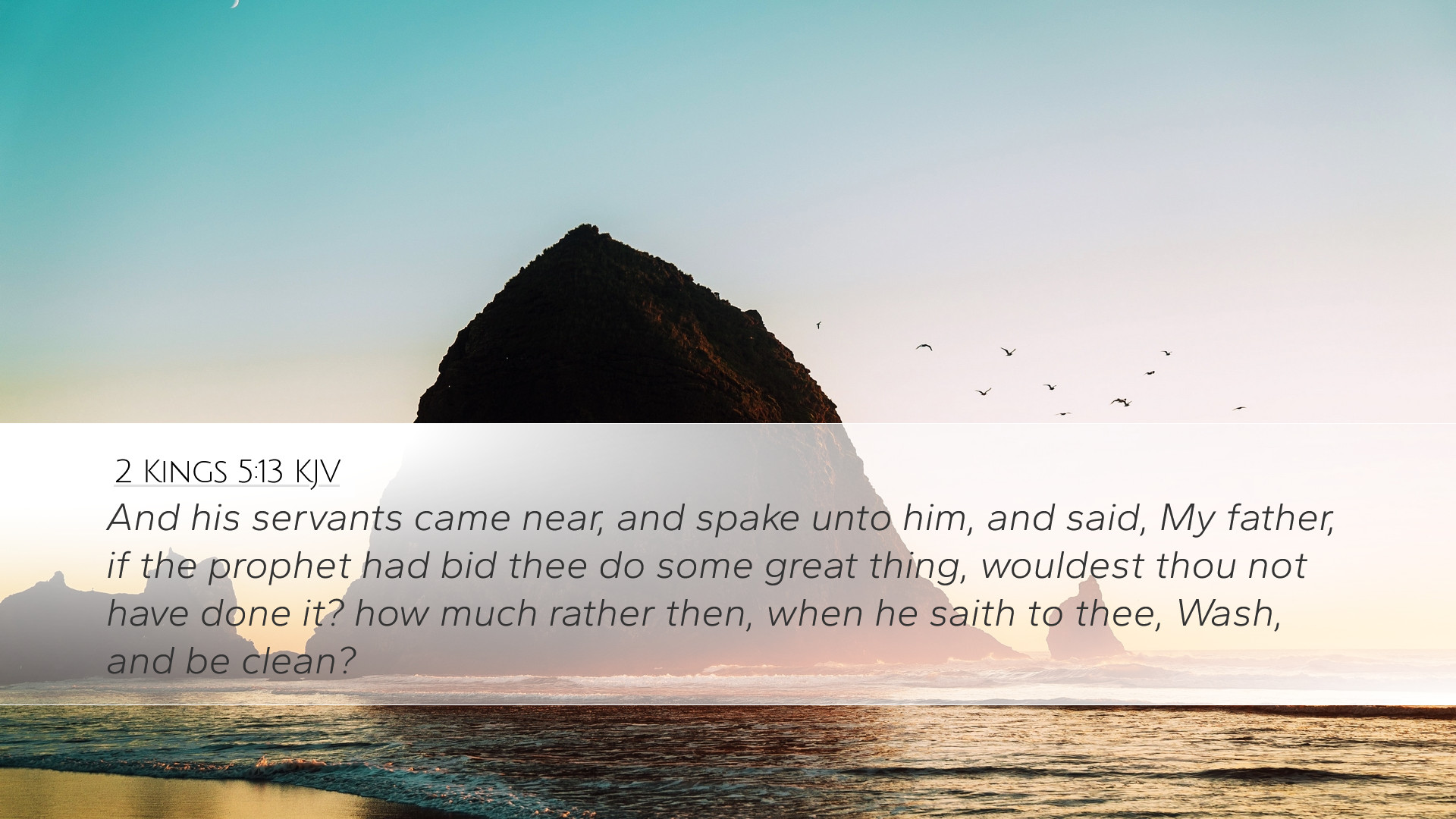Commentary on 2 Kings 5:13
Verse: "And his servants came near, and spake unto him, and said, My father, if the prophet had bid thee do some great thing, wouldest thou not have done it? how much rather then, when he saith to thee, Wash, and be clean?"
Context and Background
The passage is situated within the narrative of Naaman's healing from leprosy, a condition that both socially and religiously marginalized individuals in ancient Israel. Naaman, a valiant commander in the army of Syria, is struck by leprosy and seeks healing from the prophet Elisha, famed for his miraculous powers. His eventual healing reveals profound truths about faith, humility, and obedience.
Insights from Commentators
Matthew Henry
Matthew Henry emphasizes the tension in Naaman’s heart between pride and desperation. Initially, Naaman expects a grand display of healing, reflecting a common misconception that God’s work must align with human expectations of grandeur. The counsel of his servants serves as a pivotal moment, illuminating the simplicity and yet the profoundness of faith: obedience to divine commands does not always come clothed in majesty.
Albert Barnes
Barnes elaborates on Naaman's struggle with the simplicity of the command given by Elisha. The suggestion from his servants highlights how readily he would have obliged had the prophet required a monumental task. This underscores the human tendency to regard the spectacular over the mundane. Barnes notes that the process of washing in the Jordan symbolizes a deeper spiritual cleansing attainable only through humble obedience to God's will.
Adam Clarke
Clarke provides a linguistic and cultural analysis of the text, emphasizing the term "wash," which denotes a radical act of cleansing, metaphorically representing repentance and faith in God’s promises. He comments on how Naaman's initial resistance is a mirror reflecting human reluctance to accept simple faith. Clarke also notes the irony that the waters of Israel, viewed by Naaman as inferior to Syrian rivers, should become the medium for his cleansing, highlighting that God's ways surpass human reasoning.
Theological Implications
This verse brings to the forefront crucial theological themes:
- Faith vs. Works: Naaman’s hesitance illustrates the struggle between faith and self-sufficiency. The suggestion of doing a ‘great thing’ aligns with the human inclination to earn divine favor through deeds rather than humble trust.
- The Power of Humility: Naaman's eventual obedience — washing in the Jordan — is an act of humility. It reflects the biblical principle that God resists the proud but gives grace to the humble (James 4:6).
- Inclusivity of God’s Grace: The fact that a foreigner, a commander from Syria, is the recipient of God’s miraculous power signals the expansive nature of God's grace and healing, prefiguring New Testament themes of inclusion and redemption.
Practical Application
For pastors, students, theologians, and scholars, this passage can serve as a rich source of practical lessons:
- Preaching on Humility: The need for humility in coming to God serves as a focal point for sermon preparation, encouraging believers to let go of pride and preconceptions.
- Encouragement for Obedience: Discipleship involves obedience to often simple commands from God. This passage can facilitate discussions on the importance of responding faithfully to God’s leading.
- Pastoral Care: The dynamics of Naaman's healing journey can be paralleled in the lives of many who are resistant to perceiving God's grace in simple ways. Pastoral care can benefit from exploring how realizations of God’s work in ordinary life prompts healing and transformation.
Conclusion
The narrative of Naaman’s healing in 2 Kings 5:13 challenges believers to confront their biases towards what constitutes God's work in the world. It invites an examination of faith as a journey often presented in unexpected and humble forms. The commentary insights from Matthew Henry, Albert Barnes, and Adam Clarke weave a theological tapestry that celebrates God's grace extended to all and the profound effects of simple obedience. The challenges laid before Naaman resonate as timeless reminders for spiritual leaders and learners to embrace humility, simplicity, and faithfulness in their walk with God.


